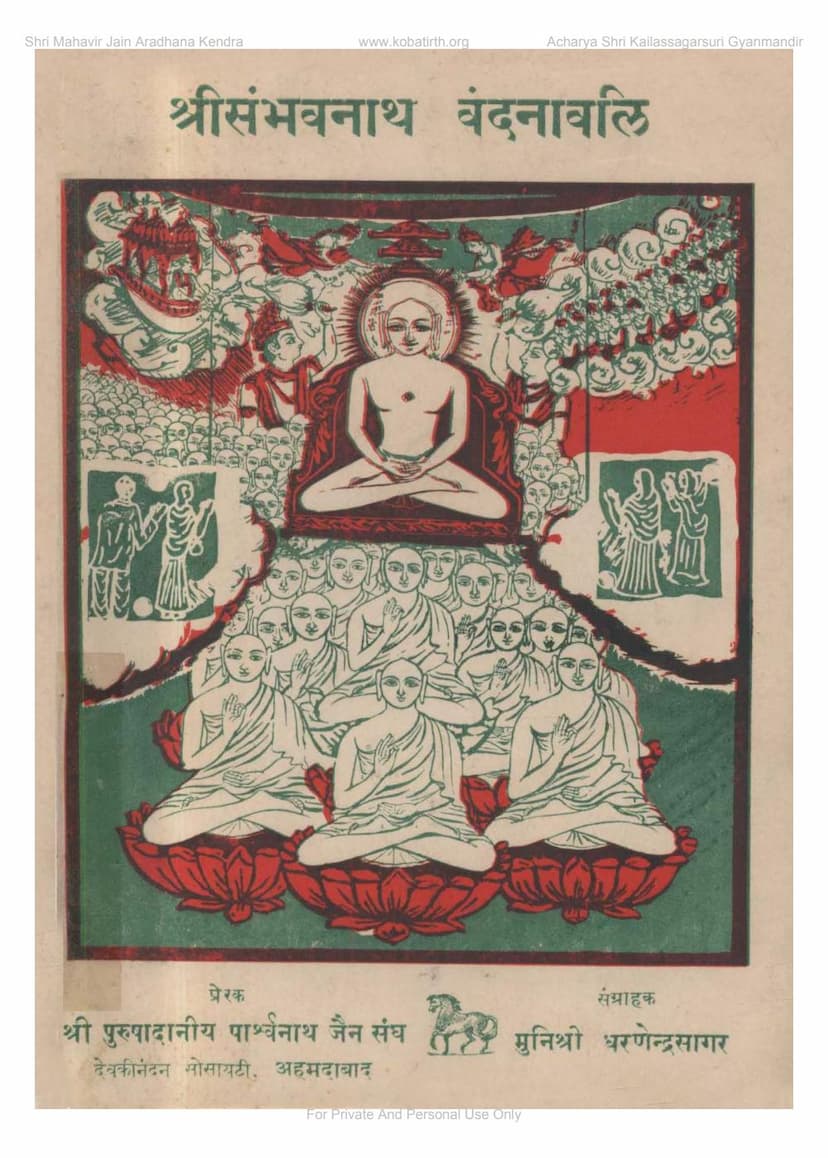Sambhavnath Vandanavali
Added to library: September 2, 2025
Loading image...

Summary
The provided text is a comprehensive collection of Jain prayers, hymns, and verses dedicated to Lord Sambhavanath, the third Tirthankara in Jainism. Titled "Sambhavnath Vandanavali," this book has been compiled by Muni Shri Dharanendrasagar and published by Vitthalbhai Jivabhai Patel, Ahmedabad.
The book is structured to offer various forms of devotion and praise to Lord Sambhavanath, including:
- Chaitra Vandanani (Temple Worship Verses): A collection of verses meant for worship within Jain temples.
- Stutayo (Praises): Hymns that glorify the virtues and deeds of Lord Sambhavanath.
- Stavanani (Devotional Songs): Songs expressing deep devotion and reverence.
- Stotr-adi (Other Devotional Works): A broader category encompassing various devotional writings.
- Gujarati Ekpadi Stuti (Gujarati One-Line Praises): Concise praises in Gujarati.
- Stavana (Devotional Pieces): A significant portion of the book features numerous individual devotional pieces, often with attributions to various Jain scholars and monks. These appear to be organized by the author of each piece and the number of verses.
- Chhandavali (Prosody): The latter part of the book details various poetic meters (chhanda) used in Jain literature, such as Malini, Anushtup, Vasantatilaka, Indravajra, Shardulvikriditam, etc., explaining their structure and characteristics. This suggests the book aims not only to provide devotional content but also to educate on the poetic forms used in Jain tradition.
Key themes and content highlighted across the pages:
- Genealogy and Life Events: References are made to Lord Sambhavanath's birth in the Ikshvaku dynasty, his parents (King Jitari Sena and Queen Shreena), his birth city (Shravasti), his divine symbols (horse), his renunciation, his attainment of Kevala Jnana (omniscience), and his attainment of Moksha (liberation).
- Attributes and Virtues: The verses frequently describe Lord Sambhavanath as the destroyer of enemies (kama, krodha, moha), the bestower of happiness and liberation, pure, luminous, merciful, wise, and an embodiment of dharma.
- Devotional Acts: The book encourages remembering, meditating on, and praising Lord Sambhavanath as a means to overcome worldly suffering, attain spiritual merit, and achieve salvation.
- Authorship and Compilation: The compilation by Muni Shri Dharanendrasagar, with the inspiration of Shri Purushadaniya Parshwanath Jain Sangh, Ahmedabad, and the publication by Shri Simandhar Swami Jin Mandir, Mehsana, are noted. The text also acknowledges various Acharyas and scholars who composed these devotional works.
- Language and Style: The collection includes verses in Sanskrit and Prakrit, with a significant portion in Gujarati, reflecting the rich devotional literature within the Jain tradition. The poetic meters used are diverse and sophisticated.
- Numbering and Organization: The book is meticulously organized with page numbers and a detailed index (Anukramavali) listing the various hymns, their authors, and page numbers, making it a valuable resource for practitioners and researchers.
In essence, "Sambhavnath Vandanavali" is a devotional treasury, meticulously compiled to facilitate the worship and glorification of Lord Sambhavanath, offering a wide spectrum of devotional literature for the spiritual edification of the Jain community.